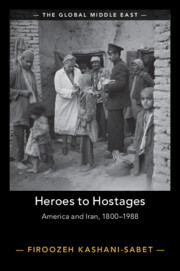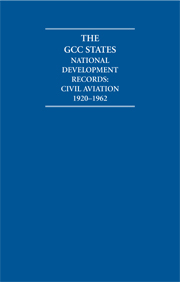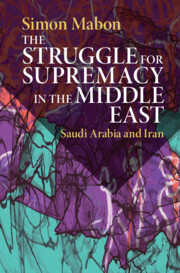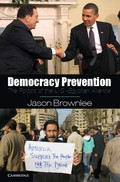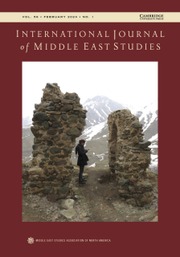Heroes to Hostages
America and Iran, 1800–1988
$34.99 ( ) USD
Part of The Global Middle East
- Author: Firoozeh Kashani-Sabet, University of Pennsylvania
- Date Published: August 2023
- availability: This ISBN is for an eBook version which is distributed on our behalf by a third party.
- format: Adobe eBook Reader
- isbn: 9781009322102
Find out more about Cambridge eBooks
$
34.99 USD
( )
Adobe eBook Reader
Other available formats:
Hardback, Paperback
Looking for an examination copy?
If you are interested in the title for your course we can consider offering an examination copy. To register your interest please contact [email protected] providing details of the course you are teaching.
-
It is easy to forget, given the oppositional dynamic between Iran and the United States of the last 50 years, that these two countries once shared productive partnership. Tracing US-Iran relations over two turbulent centuries, Firoozeh Kashani-Sabet considers when and how this relationship went awry. With careful attention to social and cultural as well as diplomatic developments, Kashani-Sabet shows that the rift did not originate in flashpoints of crisis, like the 1953 coup or the 1979 Islamic Revolution, but was instead long in the making. Drawing from a wealth of English and Persian-language sources, many of which were previously unavailable or unacknowledged, this book considers the relationship from the vantage point of Iranian society and the experiences of an evolving Iran that strived to accommodate American and great power politics. Following these two nations through wars, decolonization, and revolution, Kashani-Sabet presents an invaluable history of a diplomatic rivalry that informs geopolitics to this day.
Read more- Outlines the changing relationship between the U.S. and Iran, including the role of race relations, the Vietnam crisis, decolonization, and the sexual revolution
- Uses previously unavailable Persian-language sources to shed light on Iranian concerns and motivations
- Offers a holistic diplomatic history, drawing attention to important social and cultural changes
Reviews & endorsements
‘Professor Firoozeh Kashani-Sabet analyses and historicises the broken bridges within the US-Iranian relationship. She weaves a story that is both personal and political, rich in detail and insight that is placed within a broader Middle Eastern scope. The book challenges stereotypes of Iran and Islam, moves away from simplistic explanations for the present, and holds governments and leaders on both sides accountable. She restores humanity in history and seeks common ground from which some mutual understanding can emerge.’ Rowena Abdul Razak, London School of Economics
See more reviews‘A fascinating account of a vital relationship. Kashani-Sabet’s penetrating and balanced analysis of the US-Iran relationship over the last two centuries illuminates and contextualises a relationship which is far more complex, nuanced and interesting than the current political mythology would have us believe.’ Ali Ansari, University of St Andrews
‘Based on meticulous research, this book is a panoramic, authoritative, and richly detailed account of the U.S.-Iran relationship over the past two centuries. It pays careful attention to the changing cultural, societal, and political conditions that shaped each side’s narratives of its own, and the other’s, stance and interests at every stage in the course of this fraught relationship.’ Ali Banuazizi, Boston College
‘This is a brilliant account of a surprisingly neglected topic: the history of Iran’s long and troubled relationship with the USA. A work of original and scrupulous scholarship, it will certainly become a classic in the field while its elegant writing style makes it accessible to the general reader as well as the specialist.’ Stephanie Cronin, University of Oxford
‘This is a fascinating, deeply-researched cultural history of American-Iranian relations. Based on an impressive range of sources, Firoozeh Kashani-Sabet skillfully traces cultural encounters and mutual perceptions and provides a profound insight into the last two hundred years of Iran’s history.’ Bianca Devos, Philipps University Marburg
‘The roots of U.S.-Iranian relations go back further than the hostage crisis of 1979–1981. They go back farther than the U.S.-led coup of 1953. Professor Kashani-Sabet, an eminent historian of Iran, traces U.S.-Iranian relations - governmental and non-governmental - back to the nineteenth century, including longstanding cultural exchanges that offer a path beyond current hostilities.’ Charles Kurzman, University of North Carolina at Chapel Hill
‘The Iranian revolution of 1979 with its iconic anti-American slogans and the subsequent hostage crisis inaugurated a period of hostility between Iran and the US that has occluded a history of engagement and cooperation between the two nations dating back to the nineteenth Century. This book is an invaluable reminder of that rich history.’ Nasrin Rahimieh, University of California, Irvine
‘This book brings Iran to the centre stage of world politics, explaining how Western economic and military power was built on a predatory relation to Iran’s national body, geography, and resources, and how, in spite of it, Iran protected its independent agency. An authentic global history of Iran-US relations.’ Paola Rivetti, Dublin City University
Customer reviews
Not yet reviewed
Be the first to review
Review was not posted due to profanity
×Product details
- Date Published: August 2023
- format: Adobe eBook Reader
- isbn: 9781009322102
- availability: This ISBN is for an eBook version which is distributed on our behalf by a third party.
Table of Contents
Preface
A note on transliteration
Introduction
Part I. Uncertain Overtures (1796-1914):
1. Pluralist Persia: a land of many religions
2. The portals of Persepolis: Persian antiquity and American curiosity
3. A martyr and many masters: America and Iranian constitutionalism
Part II. Desultory Mordernities (1914-1941):
4. Iran in transition: war, famine, and recovery, 1914-1925
5. Flirting with secular modernity: America and social change in Iran, 1925-1939
6. Investing in Iran: frontiers and foreign competition, 1925-1939
Part III. Cataclysms (1941-1963):
7. Unwelcome visitors: the occupation of Iran during World War II
8. Subverting sovereignty: the politics of oil
9. Roots of revenge: cultural flux and specters of violence
Part IV. A Troubled Middle East (1960-1979):
10. The anti-Aryan moment: decolonization, race, and human rights
11. A political minefield: Iran between Israel and pan-Arabism
12. The Shah's fight for hegemony: from the Persian Gulf to the Vietnam war
Part V. The Schism (1978-1988):
13. The picketers come of age: from civil disobedience to armed protest
14. Burning bridges: revolution and the rift in US-Iranian relations
15. Neither heroes nor hostages.
Sorry, this resource is locked
Please register or sign in to request access. If you are having problems accessing these resources please email [email protected]
Register Sign in» Proceed
You are now leaving the Cambridge University Press website. Your eBook purchase and download will be completed by our partner www.ebooks.com. Please see the permission section of the www.ebooks.com catalogue page for details of the print & copy limits on our eBooks.
Continue ×Are you sure you want to delete your account?
This cannot be undone.
Thank you for your feedback which will help us improve our service.
If you requested a response, we will make sure to get back to you shortly.
×
